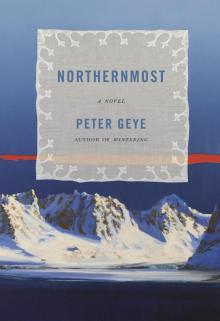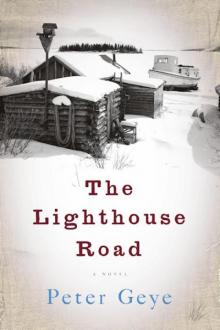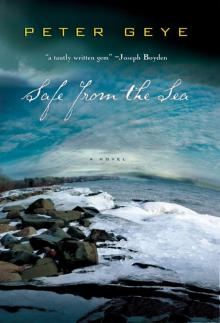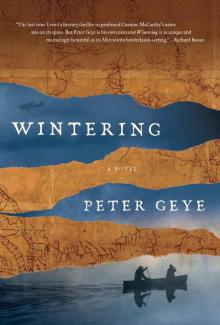- Home
- Peter Geye
Safe from the Sea
Safe from the Sea Read online
Safe from the Sea
Safe from the Sea
Peter Geye
This is a work of fiction. The names, characters, places and incidents are
either the product of the author’s imagination or are used fictitiously,
and any resemblance to actual persons living or dead, business
establishments, events, or locales is entirely coincidental.
Copyright © 2010 by Peter Geye All rights reserved. This book, or parts thereof,
may not be reproduced in any form without permission.
Library of Congress Cataloging-in-Publication Data ISBN 978-1-60953008-2
Library of Congress Cataloging-in-Publication Data Geye, Peter.
Safe from the sea Peter Geye.
>p. cm.
ISBN 978-1-60953008-2
1. Fathers and sons—Fiction. 2. Prodigal son (Parable)—Fiction.
3. Minnesota—Fiction. 4. Domestic fiction. I. Title.
PS3607.E925S24 2010
813’.6—dc22
2010023074
1 3 5 7 9 10 8 6 4 2
BOOK DESIGN BY SH • CV
First Printing
For Dana, of course.
And for
F.A.
C.D.
E.M.
Safe from the Sea
PROLOGUE
The officer stood the midnight watch, his hand easy on the wooden wheel. He was steering the ore boat Ragnarøk, five hours outside Duluth harbor and downbound for the Superior Steel Works in Detroit.
“Jacobsen,” he called.
“Sir?” The wheelsman stepped to the helm.
“Bear northeast, Jacobsen. And never mind this.” He tapped the binnacle dome. “Steer for Polaris.” He pointed up at the firmament. “The top of the dipper.” Their load of taconite had sent the compass dithering.
“Yes, sir.”
The officer stepped to the chart. He withdrew his tobacco and papers from the inside pocket of his coat and rolled a cigarette. In the weary light of a twenty-watt bulb he studied their course. They were some twenty nautical miles north of the Keweenaw Peninsula in water a hundred and fifty fathoms deep. He marked their position. It was a passage plotted ages ago, one he knew by rote. He stood there because he was a prudent man, strict in his habits and in his discipline. An upholder of protocol. Consulting the charts was written into his duties.
He stepped outside, rounded the pilothouse decking. With his feet astride the keel line he lit his smoke. There was the sky to the north. The aurora borealis. Coronas the color of ice, the color of fire. This man was no philosopher, but neither was he blind. He could see what lay before him.
When his smoke was down to its nub he flicked it over the deck railing. He tucked his chin into his coat and again rounded the decking.
Back in the pilothouse he said, “Jacobsen, do you have children?” “No, sir.”
“My first child was born nine days ago. A son. Nine days ago, and here I am bound for the Soo. Can you beat that?” “What’s his name, sir?”
“My wife named him Noah.” A weather report warning of snow squalls off the Keweenaw crackled over marine radio. This sent both men’s eyes back to the north.
“Look at that sky, Jacobsen. Have you ever seen anything like it?” “It’s something.”
“If only my son could see it.” “Someday, sir.”
This pacified the officer. “Someday,” he echoed.
The officer settled into his loneliness, thinking of his son and wife. The feeling was specifically sad and beautiful. The colors in the sky vanished, were replaced with the brightness of stars.
By the time they cleared the Keweenaw the sky was indeed squally. A chop had come up with the wind. The officer checked his pocket watch against the sky.
I.
Red, Right, Returning
ONE
That morning Noah boarded a plane for Duluth. By seven o’clock he was driving a rental car down Mesaba Avenue. Between the intermittent swoosh of the windshield wipers he recognized the city he harbored in his memory. It lay below him smothered in fog, the downtown lights wheezing in mist. Though he could not see the lake in the distance, he knew it rested beyond the pall. Soon he pulled onto Superior Street. The manholes blowing steam might have been freeing ghosts.
It had been his plan to drive up to Misquah, but he’d been delayed during a Minneapolis layover and decided it was too late. Instead he drove onto Lake Avenue, parked, and stepped out into the evening. Now he could see the lake, a dark and undulating line that rolled onto the shore. The concussions were met with a hiss as the water sieved back through the pebbled beach. The fog had a crystalline sharpness, and he could feel on his cheeks the drizzle carried by the wind. It all felt so familiar, and he thought, I resemble this place. And then, My father, he was inhabited by it.
But Duluth had also changed. Where now T-shirt and antique shops kept address, dive bars and pawnshops and shoe-repair shops had once done a dismal business. More than a few of Noah’s boyhood friends had ordered their first steins of beer in the slop shops that were now coffeehouses and art galleries. As a kid Noah had seen grown men stumble from doorways, drawing knives as they fell, ready to fight. Now he saw squalling kids and husbands and wives bickering over where to have dinner. The hotels had once offered hourly rates, now half-a-dozen national chains were staked in Canal Park. There were bookshops, ice-cream parlors, wilderness outfitters, toy stores, even a popcorn and cotton-candy cart, all lining the street like a Vermont ski town.
There did remain two stalwarts: the Tallahassee and the Freighter. The former, though it advertised JAZZ! ON SATURDAYS, was a topless bar with filthy taffeta curtains bunched in the windows. The latter was where Noah had ordered his first beer more than twenty years ago. It had also been his father’s hideaway of choice. They were next door to each other, laggards from a vanished time.
For all its squalor, the Freighter was a landmark, a bare-knuckle place that had not given way to slumming conventioneers or fraternity brothers down from the colleges. Dark, greasy air thick with smoke and blue neon hung like the fog as Noah stepped in for a draft and something to eat. A gauzy linoleum floor curled up from rotten floorboards, and a cobwebbed fishing net hung from the ceiling. Behind the bar, above the bottles of cheap booze, a series of photographs of ore boats in teakwood frames were nailed into the wall. A few tipplers sat at the bar, and behind the pull-tab counter a silver-haired churchgoer did a crossword puzzle. The sign above her head announced a meat raffle on Wednesdays.
Noah took a seat at the bar and swiveled around. Other than the murmuring of the drinkers and tinkling of pint glasses, the only sound came from an ancient television on the end of the bar broadcasting the local news.
“You look familiar,” the barman said, “but you aren’t from around here.” An old man with a ruddy face and drooping eyes, he looked familiar to Noah, too.
“I haven’t been here in years,” Noah said. “But my old man used to call this place home.”
“Who was your old man?”
“Olaf Torr.”
“Oh, Christ,” the man said, wiping his hands on a rag before reaching under the counter for a bottle of Wiser’s. “If you’re Torr’s boy, this is on me.”
Before Noah could decline, two shots of whiskey sat on the bar.
“I can’t drink this,” Noah said.
The barman drained the shot he’d poured for himself and smacked his lips. “You ain’t Torr’s boy if that’s true.” He poured another drink for himself. “Your pop’s dead?”
“Jesus, no,” Noah said. Then added, “Not yet.”
“He still living up around Misquah?”
“Unbelievably, he is.”
The barkeeper had not taken his
eyes from Noah. He shook his head thoughtfully. “We used to fall on over to the Tallahassee every odd day of the week, your pops and me. Watch them girls shake tail.”
“You corrupted him, then.”
“Sure, he needed corrupting.” His father’s old crony sipped the second ounce of Wiser’s. “What brings you home?”
“I’m headed up to see him.”
“You tell that son of a bitch Mel says hello.”
“I’ll do that,” Noah said.
“You hungry?” Mel asked.
Noah ordered a burger basket and a pint of beer to help with the whiskey.
. . .
THE LAST TIME he had been in the Freighter was almost six years ago, on the morning after the wedding of a childhood friend. Before heading back to Boston he’d met his father for breakfast. On the mismatched barstools half-a-dozen gray-haired men sat like barnacles. When the door creaked shut behind Noah they turned in unison to sneer at the schoolteacher in pressed khaki trousers standing in the doorway. Olaf stood up, last in line and farthest from the door, looked down at Noah over the top of his glasses, and pulled out the barstool next to his own. “Hello, boy,” he said across the room as he pushed two empty Bloody Mary glasses into the bar gutter and crushed out a cigarette. “Come here. Have a seat. What do you know?”
As Noah approached, he took inventory of the old man: A baggy chambray work shirt frayed at the collar and cuffs and a pair of dungarees cinched with a canvas belt brought attention to how thin he had become; his hair and beard were both completely white now and even more unkempt than Noah remembered; his black boots were untied. As Olaf extended his hand, Noah saw evidence of the arthritis his sister had warned him of, but when he took the old man’s hand, the strength of the grip surprised him.
“Hi, Dad.”
Olaf pulled the barstool out further. When Noah sat, his father stepped back, sizing up Noah in his own manner. “Penny loafers, huh?”
Noah shrugged and held his hands up in a gesture of deference.
“What’ll you drink?” Olaf said.
“Orange juice. It’s ten o’clock in the morning.”
“Orange juice for the boy, Mel!”
Whereas the other patrons had newspapers or each other for company, Olaf had been sitting alone, with only his drink before him. When he rejoined Noah at the bar, he resumed the posture of a loner, looking straight ahead at the bar back and rolling another cigarette.
Their talk over the next hour could hardly have passed for conversation. Between bites of runny eggs and greasy hash browns, Olaf asked Noah about his job and his girlfriend. Noah asked after the old man’s health and the state of the cabin up on Lake Forsone, where Olaf had recently moved after selling their house on High Street. Olaf drank two more Bloody Marys with Grain Belt snits. Occasionally his voice surged and the other men in the bar set their drinks down to look at him. Everyone knew who he was, of course, and there seemed to be dueling sympathies in their attention. On the one hand, they must have admired his tragedy, and on the other, pitied his churlishness.
In a lull during their breakfast Noah said, “I’m getting married.”
“That’s what your sister tells me.” Olaf shifted his gaze from the bar back to the ceiling and blew a stream of smoke. “Getting hitched,” he continued under his breath.
Noah slid his plate forward and swiveled to face his father. “In October. I hope you’ll be there.”
Instead of answering, Olaf summoned Mel. “The boy’s settling down, partner,” he announced. “Tying the knot.”
“The slipknot?”
“That’s the one,” Olaf said.
“God help him,” Mel replied.
“I’d offer to buy you a drink,” Olaf said, turning his attention back to Noah, “but you’ve already got your juice.” Instead he motioned for another Bloody Mary. Mel set about making it. “A slipknot, it’s like a noose,” Olaf explained. “It’s a joke, boy.”
“A good one, too.”
Noah remembered looking his father in the eye and seeing nothing but a boozy vacancy. The old man’s drunkenness had always struck Noah as cumulative. Olaf had not spent nights in the hoosegow, he’d not crashed the family car into light poles or missed mortgage payments because his paycheck had been squandered here at the Freighter. Despite this, the years had surely added up to something, to some soggy history that diminished the old man. Noah had an impulse to scold him but did not. Instead he rose to leave. “I’ve got a flight,” he explained. “I hope you’ll make the wedding.” He put his hand on his father’s shoulder in a gesture that should have been reversed. “Take care of yourself, okay?”
Olaf looked again over the top of his glasses. “I’ll see you in October.”
“YOU READY FOR another beer?” The bartender’s voice came as if from that morning years ago. He cleared the empty basket, took measure of Noah’s shot glass on the bar.
“No, thanks.”
“I swear, if you weren’t the spitting image of that old cuss, I’d suspect you of lying.” He pointed at the whiskey.
“Sorry,” Noah said. “I appreciate the thought. I’ve just never been able to stomach the stuff.”
“No harm,” he said, then placed the tab on the bar.
“Are there any boats tonight?” Noah asked.
Mel looked at the clock on the wall. “Erindring’s outbound in an hour. Load of coal for the good people of Stockholm.”
Noah laid payment on the tab. “Does he ever come down here anymore? You ever see him?”
“Your old man? Nah. I haven’t seen him in what, five years? Maybe longer.”
“I’ll tell him you said hello. Thanks for everything.”
“Anytime, now. Good-night.”
AT THE BREAKWATER he listened to the canal water lapping against the wall. Herring gulls squawked and rolled and dove on invisible currents above the aerial bridge. Every couple of minutes one would pull up on the breakwater and hop toward Noah with a cocked head. They appeared famished and well fed at the same time. Their iridescent eyes glistened in the lamplight. He had always loved watching the gulls and thought there was something majestic about them up here, something very different from the scavenger gulls back in Boston. Here the gulls fished first and begged only after the smelt had gone out.
He looked over the breakwater wall, caught his shadowy reflection in the waves, and wondered how many times during the last twenty-four hours he’d tried to remember his father’s aged face. Even as Noah had replayed the memories of that morning years ago in the Freighter, he had not quite been able to summon it.
The last of the gulls flew into the harbor, and he turned to head back. A light rain now mixed with the fog, and the temperature seemed to be falling. Not fifty paces to his left the foyer of the maritime museum was still lit. He approached the entrance and saw that it was open for another half hour. Inside, the split-level entryway was covered with posters and artifacts representing the Great Lakes shipping industry. He took the ramp up, which led into a large room with windows overlooking the canal. But for the person sitting behind the information desk, Noah was alone in the museum.
A crumpled lifeboat hung suspended from the ceiling on the edge of the main room. Next to it one of the anterooms advertised itself as the RAGNARØK EXHIBIT. Noah ventured in. A montage of photographs hung on the wall, and his father’s image glared back from two. The first took Noah’s breath away. It was an eighteen-by-twelve-inch black-and-white of the crew of the Rag. They huddled dockside in front of the black-hulled freighter during a late-winter snow squall. Taken in March 1967, the day of her first cruise that shipping season, it reminded Noah of countless other departures. Most of the thirty faces in the photograph were blurred in the snow or hidden by the wool collars of the crew’s standard-issue peacoats, but the image of his father’s gaze—unblemished by the snow and unhidden by his collar—was clear. The placard beside the photo said: THE CREW OF THE ILL-FATED SUPERIOR STEEL SHIP SS RAGNARØK, MARCH 1967. THE SHIP IS AT BERTH A
T THE SUPERIOR STEEL DOCKS IN DULUTH HARBOR. THE RAG WOULD FOUNDER IN A GALE OFF ISLE ROYALE EIGHT MONTHS LATER. TWENTY-SEVEN OF HER THIRTY HANDS WERE LOST. It also listed, in parentheses, each of the men, from left to right, front to back.
Noah recognized the second photograph, taken of the three survivors. Luke Lifthrasir lay on a four-handled gurney being carried up the glazed boulder beach, his gauze-wrapped arm raised triumphantly in a frostbitten fist. Two men in Coast Guard uniforms tended to Bjorn Vifte, who sat huddled under a wool blanket. Noah’s father sat in the edge of the picture, alone, his shoulders slumped over his knees, the small of his back resting against an ancient cedar tree that grew from a cleft in the bedrock. Blood frozen in parallel lines stained his cheek. In the background, a photographer aimed his camera at the same wrecked lifeboat that hung on display from the ceiling in the next room. The second placard read: THE THREE SURVIVORS OF THE WRECK OF THE SS RAGNARØK, ASHORE AT LAST, HAT POINT, WAUSWAUGONING BAY, LAKE SUPERIOR. NOVEMBER 6TH, 1967.
Noah toured the rest of the museum like a somnambulist. A collection of ship models and more photographs chronicling the nautical history of Lake Superior filled one room. Recovered relics from Great Lake shipwrecks—forks, lanterns, life vests, a teakettle, a sextant, a compass, an oil can, a coal shovel, a brass bell—lined the glass cases that circled another exhibit. A row of small rooms replicated the cabins of different ships, a sort of timeline of living conditions aboard Great Lakes freighters. A steam-turbine tugboat engine, circa 1925, twenty feet tall, rose between the split-level entry. And the museum’s centerpiece, a model pilothouse complete with an antique wooden wheel, a chart room, and a brass Chadburn set to full steam, sat in the middle of the main hall.
From behind the wheel Noah looked out onto the lake. Although it was dark, he could see through the bare branches of a maple tree. Beyond the canal breakwaters and the channel lights the lake disappeared into an even deeper darkness. To his left, he knew, the hills stretched above town, shrouded in a chrysalis of late-autumn mizzle. And behind him the aerial bridge loomed like a skeleton.

 Northernmost
Northernmost The Lighthouse Road
The Lighthouse Road Safe from the Sea
Safe from the Sea Wintering
Wintering